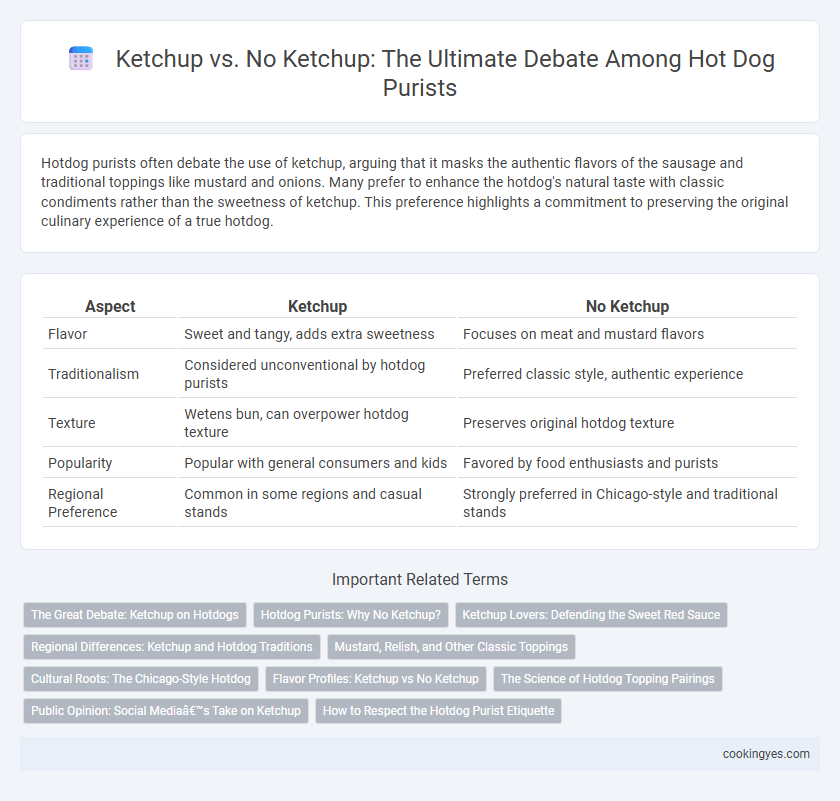Hotdog purists often debate the use of ketchup, arguing that it masks the authentic flavors of the sausage and traditional toppings like mustard and onions. Many prefer to enhance the hotdog's natural taste with classic condiments rather than the sweetness of ketchup. This preference highlights a commitment to preserving the original culinary experience of a true hotdog.
Table of Comparison
| Aspect | Ketchup | No Ketchup |
|---|---|---|
| Flavor | Sweet and tangy, adds extra sweetness | Focuses on meat and mustard flavors |
| Traditionalism | Considered unconventional by hotdog purists | Preferred classic style, authentic experience |
| Texture | Wetens bun, can overpower hotdog texture | Preserves original hotdog texture |
| Popularity | Popular with general consumers and kids | Favored by food enthusiasts and purists |
| Regional Preference | Common in some regions and casual stands | Strongly preferred in Chicago-style and traditional stands |
The Great Debate: Ketchup on Hotdogs
Hotdog purists often reject ketchup, arguing that mustard complements the sausage's savory flavor profile without overpowering it, preserving authentic taste. Culinary experts emphasize that regional traditions, such as Chicago's ban on ketchup in hotdog recipes, highlight cultural values behind this preference. Nutritional data also shows ketchup's higher sugar content may affect the overall taste balance, reinforcing the purists' stance for simpler, tangier condiments like mustard or relish.
Hotdog Purists: Why No Ketchup?
Hotdog purists argue that ketchup masks the traditional flavors of mustard, sauerkraut, and onions, which are essential to an authentic hotdog experience. They emphasize the historical roots of the American hotdog, where savory condiments preserve the integrity of the meat and bun combination. Results from flavor profiling show that ketchup's sweetness often overwhelms the subtle spice and salt balance preferred by hotdog enthusiasts.
Ketchup Lovers: Defending the Sweet Red Sauce
Ketchup lovers passionately defend the sweet red sauce as an essential complement to the savory flavors of a hotdog, enhancing its taste with a tangy sweetness that balances salty and smoky notes. They argue that ketchup adds moisture and a familiar flavor profile that elevates the overall eating experience, particularly for those who enjoy a classic, comforting condiment. Despite purist debates, the popularity of ketchup continues to thrive in hotdog culture, making it a timeless choice for many enthusiasts.
Regional Differences: Ketchup and Hotdog Traditions
Hotdog purists often debate the use of ketchup, with regional preferences heavily influencing this stance. In Chicago and parts of the Midwest, mustard and relish dominate, while the East Coast, especially New York, sees more acceptance of ketchup on hotdogs. These regional traditions shape the cultural identity of hotdog toppings and reflect longstanding culinary customs.
Mustard, Relish, and Other Classic Toppings
Hotdog purists often reject ketchup, favoring mustard, relish, and onions for a traditional flavor profile that highlights the sausage's savory taste. Mustard provides a tangy contrast, while relish adds a sweet crunch that complements the meat without overpowering it. Classic toppings like sauerkraut and chopped onions maintain the authentic regional styles cherished by hotdog enthusiasts.
Cultural Roots: The Chicago-Style Hotdog
The Chicago-style hotdog is traditionally served without ketchup to preserve its authentic flavor profile, emphasizing ingredients like mustard, onions, relish, tomatoes, pickles, and sport peppers. Purists argue that ketchup overwhelms the complex balance of savory and tangy elements rooted in Chicago's culinary history. This cultural preference underscores a deep respect for regional identity and the classic hotdog experience unique to Chicago.
Flavor Profiles: Ketchup vs No Ketchup
Hotdog purists often debate the flavor profiles of ketchup versus no ketchup, emphasizing the balance of savory and tangy elements. Ketchup adds a sweet and acidic contrast that can overpower the natural savoriness of the sausage and mustard, while traditionalists argue that the robust, smoky, and salty notes of a plain hotdog highlight its authentic taste. The choice ultimately impacts the overall flavor complexity, with ketchup introducing a sweeter dimension that some view as detracting from the classic hotdog experience.
The Science of Hotdog Topping Pairings
Hotdog purists often debate the science behind ketchup as a topping, noting that its sweet and acidic profile can overpower the savory and smoky flavors of the sausage. Mustard, with its tangy and slightly spicy notes, chemically complements the umami-rich meat and enhances the overall taste balance. Flavor pairing research supports that contrasting taste sensations like mustard's sharpness better highlight the hotdog's complex flavor molecules than the sugary tomato base of ketchup.
Public Opinion: Social Media’s Take on Ketchup
Hotdog purists often reject ketchup, arguing that mustard's tangy flavor complements the sausage better, a sentiment echoed frequently in social media debates. Platforms like Twitter and Reddit reveal passionate discussions where many users claim ketchup masks the authentic taste of a traditional hotdog. Public opinion skews towards mustard as the classic topping, with ketchup garnering criticism for altering the original flavor profile.
How to Respect the Hotdog Purist Etiquette
Hotdog purists often insist on no ketchup, emphasizing mustard as the authentic condiment to preserve traditional flavors. Respecting this etiquette means understanding regional preferences and serving hotdogs without ketchup when in purist circles, especially in cities like Chicago. Honoring these customs reflects knowledge of hotdog culture and showcases genuine appreciation for its classic preparation.
Ketchup vs No Ketchup for Hotdog Purists Infographic

 cookingyes.com
cookingyes.com